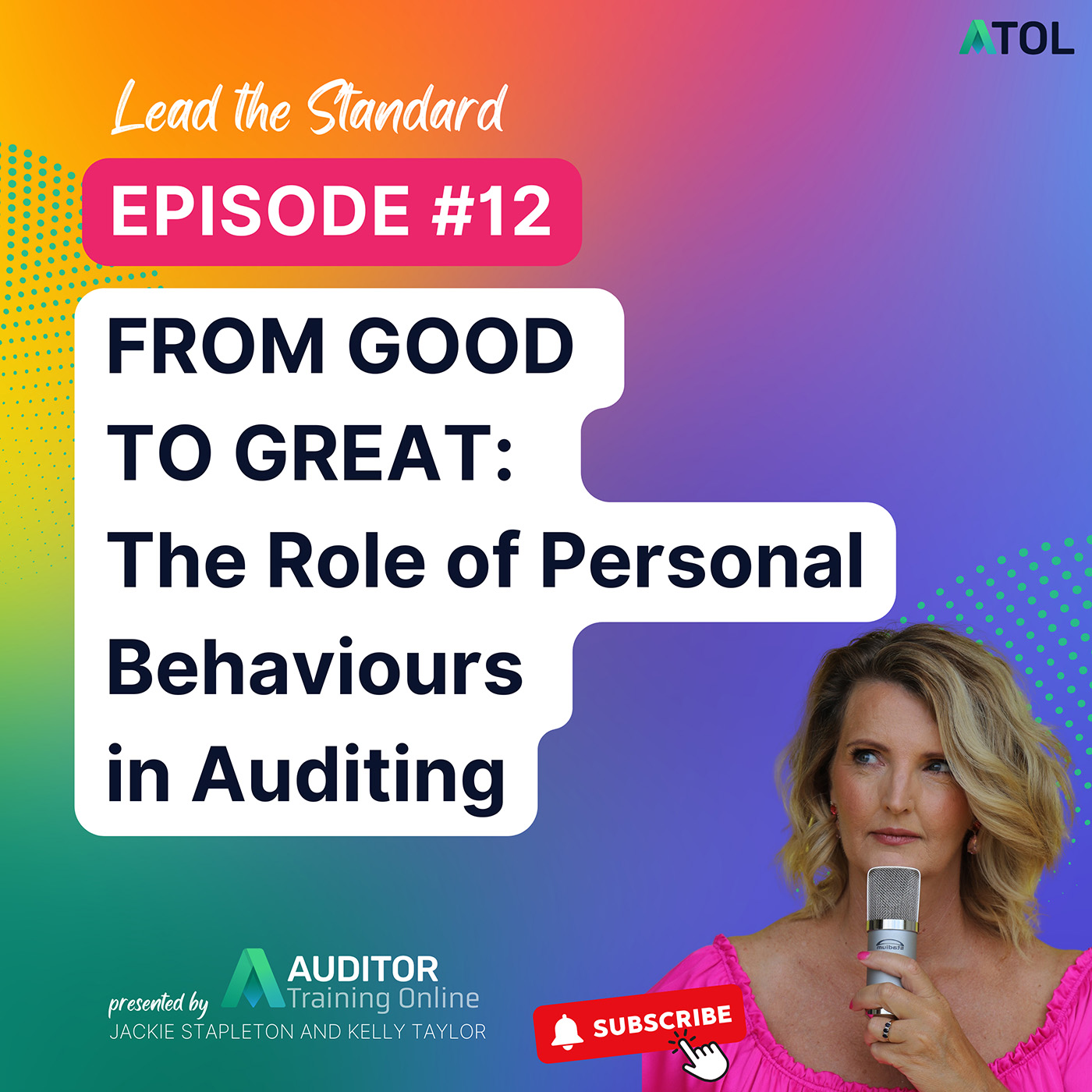From Good to Great: The Role of Personal Behaviours in Auditing
Auditing • 23 July 2024 12:00:00 AM • Author: Kelly Taylor

Sometimes we do judge the book by its cover….
We often hear that you shouldn't judge a book by its cover, but in reality, we all do it. Many of us have stories about our encounters with external auditors, both good and bad.
Imagine this: You're heading into a new client's office for an audit. Despite knowing about it for weeks, you somehow slept through your alarm. You’re out of coffee, can’t find your belt, and haven't had time to polish your shoes. You're grumpy, your brain-to-mouth filter is disengaged, and you just want to get this over with. It’s safe to say today is not a ‘people’ day!
In this scenario, you've unfortunately placed yourself in the "bad" category. But don’t worry—there's a way to flip the script and land in the "good" category instead. It all hinges on a little concept called personal behaviours.

Think of personal behaviours as the foundation of a strong building. Without a solid base, the structure can't stand tall and resilient. Similarly, personal behaviours form the core of an auditor's professional excellence.
Even on the toughest days, an auditor's professionalism, commitment to integrity, and thoroughness should shine through. Personal behaviour and attitude play a crucial role in the audit process and in building client relationships. That’s why ‘ISO 19011 Guidelines for auditing management systems’ includes thirteen personal behaviours of an auditor. These behaviours are not just for auditors but should be applied to everyday life, helping you consistently fall into the ‘good’ category.

Free Resource | Interpersonal Skills Diagnostic Quiz
Interpersonal Skills Diagnostic Quiz to evaluate and enhance your workplace communication, empathy, adaptability, and collaboration skills.
Elevating Personal Behaviours in Auditing
Consider embracing the Thirteen Personal Behaviours of an Auditor. These behaviours are not just guidelines—they are the cornerstone of ensuring you become the 'good guy' in every audit scenario. By incorporating these behaviours into your professional practice, you will enhance your interactions with clients, foster trust, and uphold the highest standards of auditing excellence. Here’s how each behaviour contributes to your success:
- Ethical: Demonstrate honesty, fairness, and integrity. This builds a strong foundation of trust with clients, showing that you are reliable and principled.
- Open-minded: Consider alternative ideas or viewpoints. This openness encourages collaboration and innovation, making clients feel valued and heard.
- Diplomatic: Be tactful in dealing with people. Diplomacy helps in navigating sensitive situations gracefully, ensuring smooth and respectful interactions.
- Observant: Stay aware of physical surroundings and activities. Being observant allows you to catch crucial details, showcasing your thoroughness and attentiveness.
- Perceptive: Instinctively understand situations. Perceptiveness enables you to read between the lines and address underlying issues, proving your depth of understanding.
- Versatile: Adjust readily to different situations. Versatility ensures you can handle various scenarios effectively, demonstrating your adaptability and competence.
- Tenacious: Stay persistent and focused on achieving objectives. Tenacity shows your dedication and commitment to seeing tasks through to completion.
- Decisive: Reach timely conclusions based on logical reasoning. Decisiveness portrays you as confident and capable, able to make sound judgments quickly.
- Self-reliant: Act independently while interacting effectively with others. Self-reliance highlights your ability to take initiative and work autonomously.
- Act with fortitude: Act responsibly and ethically even in the face of disagreement. Fortitude underscores your courage and ethical steadfastness.
- Open to improvement: Learn from situations and strive for betterment. This willingness to improve signals your commitment to personal and professional growth.
- Culturally sensitive: Be observant and respectful of the auditee's culture. Cultural sensitivity fosters respectful and inclusive interactions.
- Collaborative: Interact effectively with others, including team members and auditees. Collaboration promotes a team-oriented approach, enhancing overall audit effectiveness.
The Solution: Elevating Personal Behaviours in Auditing

For additional insights on managing oneself and improving personal behaviours, refer to this article from Harvard Business Review by Peter Drucker. Drucker's article "Managing Oneself" emphasizes the importance of self-awareness and continuous self-improvement. The key takeaways align with the Thirteen Personal Behaviours of an Auditor in several ways:
- Know Your Strengths and Values: This aligns with being self-reliant and open to improvement. Understanding your unique strengths and values helps you leverage them effectively in your professional practice and continually strive for personal growth.
- Where You Belong: Identifying the environments and roles where you can contribute the most connects to being versatile and culturally sensitive. It ensures you adapt to different situations and respect diverse cultures.
- What You Can Contribute: Focusing on what you can bring to the table ties into being ethical, decisive, and tenacious. It emphasizes contributing meaningfully, making sound judgments, and persisting in achieving goals.
- Responsibility for Relationships: Nurturing relationships with colleagues and clients relates to being diplomatic, collaborative, and open-minded. It highlights the importance of tact, teamwork, and valuing diverse perspectives.
- Plan for the Future: Continuously assessing your development and setting goals for improvement connects to being observant, perceptive, and acting with fortitude. It underscores the importance of awareness, understanding situations deeply, and maintaining ethical steadfastness.
/MS%20Internal%20Auditor%20(AU)-1.jpg?width=700&name=MS%20Internal%20Auditor%20(AU)-1.jpg)
Internal Auditor Management Systems
AU$895.00The Internal Auditor Management Systems course provides training for conducting successful internal audits across any industry globally as per ISO 19011:2018. This online, self-paced course covers the fundamentals of management systems auditing, including audit procedures and documentation. It aims to equip participants with the skills to assess an organization’s management system against criteria, write audit reports, and document nonconformities, enhancing their capability as internal auditors.
Your Next Steps
- Develop a Personal Improvement Plan: Create a detailed plan outlining specific actions to enhance behaviours such as ethical conduct, open-mindedness, and cultural sensitivity. Focus on setting measurable goals for each behaviour.
- Participate in Peer Review Sessions: Regularly engage in peer review sessions with fellow auditors to share experiences and receive constructive feedback on behaviours like diplomacy, perceptiveness, and collaboration.
- Integrate Continuous Learning into Your Routine: Dedicate time to stay updated with the latest auditing standards and techniques, focusing on behaviours such as versatility, self-reliance, and being open to improvement.

Ready to Partner with an Industry Professional
Gain confidence & become a Leader in the ISO Industry. Work with an ISO Career Expert Now and start building a brighter future.Kelly Taylor
Kelly Taylor is the Business Operations Manager at ATOL and has been a core part of the team since 2015. With a background in administration and experience across nearly every function of the business—from training delivery to project leadership—Kelly now oversees operations with a focus on clarity, structure, and practical impact. She’s driven by a genuine passion for supporting others, sharing knowledge, and helping teams and individuals thrive through change and growth.

%20(600%20x%20100%20px).png)